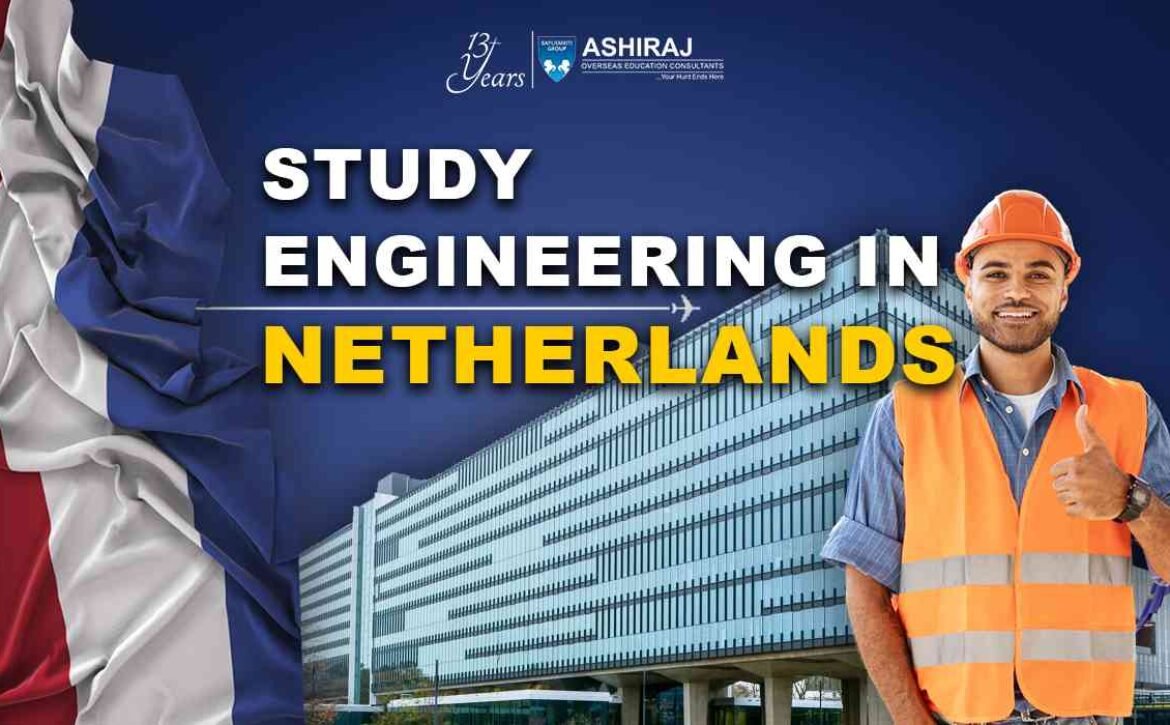
Engineering in Netherland
Engineering in the Netherlands offers a rich landscape for innovation and technological advancement. Renowned for its progressive approach to sustainable infrastructure and cutting-edge research, the Netherlands presents a compelling destination for aspiring engineers worldwide. From groundbreaking projects in renewable energy to pioneering initiatives in water management and urban planning, the Dutch engineering sector stands as a beacon of ingenuity and efficiency. With a strong emphasis on interdisciplinary collaboration and forward-thinking design principles, engineering endeavors in the Netherlands often prioritize environmental stewardship and societal well-being.
In recent years, Engineering in the Netherlands has garnered significant attention for its role in addressing global challenges such as climate change and urbanization. Leveraging a diverse talent pool and state-of-the-art facilities, Dutch engineering firms and academic institutions spearhead initiatives that redefine the boundaries of technological possibility. As the Netherlands continues to position itself as a hub for innovation and sustainability, the field of engineering emerges as a cornerstone of its economic and social progress, embodying the nation’s commitment to shaping a more resilient and equitable future.
Why to Study Engineering in the Netherlands?
- Cutting-Edge Curriculum: Engineering programs in the Netherlands are designed to incorporate the latest advancements in technology and research, ensuring students receive a comprehensive and relevant education.
- Internationally Renowned Institutions: The Netherlands is home to several top-ranked engineering schools and universities known for their excellence in research and teaching, providing students with access to world-class faculty and resources.
- Multicultural Environment: Studying engineering in the Netherlands offers exposure to a diverse and inclusive community of students and professionals worldwide, fostering collaboration and cross-cultural understanding.
- Innovative Projects and Research Opportunities: The Netherlands is at the forefront of innovation, particularly in areas such as sustainable energy, water management, and transportation, providing ample opportunities for students to engage in cutting-edge research and real-world projects.
- English-Taught Programs: Many engineering programs in the Netherlands are offered in English, making them accessible to international students and eliminating language barriers.
- Thriving Job Market: The Netherlands boasts a robust engineering sector with abundant job opportunities and competitive salaries for graduates, making it an attractive destination for those seeking a rewarding career in engineering.
- Quality of Life: With its high standard of living, vibrant culture, and bicycle-friendly cities, the Netherlands offers an unparalleled quality of life that enhances the overall student experience.
Studying engineering in the Netherlands provides a unique opportunity to immerse oneself in a dynamic and forward-thinking academic environment while gaining invaluable skills and experiences that will shape a successful career.
Top Universities to Study Engineering in Netherland
University | QS World University Ranking 2023 | Type of University | Average Annual Fees (EUR) | Programs Offered |
Delft University of Technology | 10 | Public | 2,168 | Mechanical Engineering, Electrical Engineering, Civil Engineering, Aerospace Engineering, Computer Science |
Eindhoven University of Technology | 45 | Public | 2,083 | Chemical Engineering, Industrial Engineering, Biomedical Engineering, Computer Engineering, Data Science |
University of Amsterdam | 55 | Public | 2,060 | Environmental Engineering, Systems Engineering, Software Engineering, Sustainable Energy Technology, Robotics |
University of Twente | 187 | Public | 2,036 | Nanotechnology, Applied Physics, Mechanical Engineering, Biomedical Engineering, Robotics |
Wageningen University & Research | 124 | Public | 2,095 | Agricultural Engineering, Environmental Sciences, Food Technology, Biotechnology, Water Management |
Studying engineering in the Netherlands offers a wealth of opportunities, especially with its top-ranking universities. Delft University of Technology leads the pack, ranking 10th globally, offering diverse programs in Mechanical, Electrical, Civil, and Aerospace Engineering, among others. Eindhoven University of Technology, ranked 45th, specializes in Chemical, Industrial, and Biomedical Engineering, and Computer Science. The University of Amsterdam, ranked 55th, emphasizes Environmental, Systems, and Software Engineering. University of Twente, ranked 187th, focuses on Nanotechnology, Applied Physics, and Biomedical Engineering. Wageningen University & Research, ranked 124th, excels in Agricultural Engineering, Environmental Sciences, and Food Technology. With reasonable average annual fees ranging from 2,036 to 2,168 EUR, these universities offer quality education and diverse research opportunities, making them prime choices for pursuing engineering in the Netherlands.
Course Curriculum for Engineering in Netherland
- Interdisciplinary Approach: Engineering programs in the Netherlands emphasize an interdisciplinary approach, integrating theory with practical applications to foster well-rounded engineers.
- Core Subjects: The curriculum typically covers core subjects such as Mathematics, Physics, and Computer Science, providing a solid foundation for advanced engineering concepts.
- Specialization Tracks: Students have the flexibility to choose specialization tracks based on their interests and career goals, ranging from Mechanical and Electrical Engineering to Sustainable Energy and Biomedical Engineering.
- Project-Based Learning: Engineering programs in the Netherlands often incorporate project-based learning methodologies, allowing students to work on real-world challenges and develop problem-solving skills.
- Industry Collaboration: Many universities collaborate closely with industry partners, offering students opportunities for internships, research projects, and networking with professionals in the field.
- Focus on Sustainability: Given the Netherlands’ commitment to sustainability, engineering programs often integrate coursework on renewable energy, environmental conservation, and sustainable design principles.
- International Perspective: With a diverse student body and faculty, engineering programs in the Netherlands provide an international perspective, preparing students to work in multicultural environments.
- Hands-On Experience: Practical training and laboratory work are integral components of the curriculum, ensuring students gain hands-on experience with cutting-edge technology and equipment.
The engineering curriculum in the Netherlands is designed to equip students with the knowledge, skills, and practical experience needed to thrive in a rapidly evolving global landscape. Engineering in the Netherlands emphasizes innovation, sustainability, and collaboration, making it an attractive destination for aspiring engineers worldwide.
Eligibility Criteria & Admission Requirements for Engineering in Netherland
- Language Proficiency: Applicants must demonstrate proficiency in English by providing either IELTS or TOEFL scores. For IELTS, a minimum score of 6.5 is typically required, while for TOEFL, a score of 90 or above is preferred.
- Standardized Tests: Depending on the university and program, applicants may need to submit GRE or GMAT scores. The GRE Verbal Reasoning score should be around 150, Quantitative Reasoning around 160, and Analytical Writing around 3.5. For GMAT, a score above 600 is usually expected.
- Passport & Student Visa: International students must possess a valid passport and obtain a student visa to study in the Netherlands. The visa application process involves providing proof of acceptance from a recognized Dutch university, sufficient funds for living expenses, and health insurance coverage.
- Academic Certificates: Applicants are required to submit their academic certificates, including transcripts and diplomas, to demonstrate their educational qualifications and eligibility for admission to engineering programs in the Netherlands.
- Work Experience: While not always mandatory, some engineering programs may prefer applicants with relevant work experience, especially for specialized or advanced degree programs.
Test | Minimum Score |
IELTS | 6.5 |
TOEFL | 90 |
GRE Verbal Reasoning | 150 |
GRE Quantitative Reasoning | 160 |
GRE Analytical Writing | 3.5 |
GMAT | 600 |
Meeting these eligibility criteria ensures that candidates are well-prepared to undertake engineering studies in the Netherlands, fostering a diverse and qualified cohort of students in the country’s dynamic academic landscape.
Documents Required for Studying Engineering in Netherland
- Passport: A valid passport is essential for international students applying to engineering programs in the Netherlands. It serves as proof of identity and nationality throughout the application process and during the duration of study.
- Letters of Recommendation (LOR): Applicants typically need to provide two letters of recommendation from academic or professional sources attesting to their qualifications, character, and potential for success in engineering studies.
- Statement of Purpose (SOP): The SOP is a personal statement outlining the applicant’s academic background, career goals, and reasons for choosing a specific engineering program in the Netherlands.
- Curriculum Vitae (CV): A comprehensive CV detailing the applicant’s educational background, work experience, research projects, publications, and relevant skills is required as part of the application package.
- Official High School Transcripts and Educational Certificates: Applicants must submit official transcripts and certificates from their high school or secondary education institutions, demonstrating their academic achievements and qualifications for admission to engineering programs.
- Work Experience Certificate: If applicable, applicants should provide a work experience certificate highlighting any relevant professional experience in the field of engineering or related industries.
- Proof of Financial Resources: International students must demonstrate sufficient financial resources to cover tuition fees, living expenses, and other costs associated with studying in the Netherlands. This may include bank statements, scholarship awards, or sponsorship letters.
Ensuring the timely submission of these documents is crucial for a successful application to engineering programs in the Netherlands, facilitating the admission process and enabling students to pursue their academic and career aspirations in a dynamic and innovative environment.
Admission Process for Engineering in Netherland
- Research Universities: Begin by researching universities in the Netherlands offering engineering programs that align with your interests and career goals. Consider factors such as program reputation, faculty expertise, and research opportunities.
- Check Eligibility Requirements: Review the admission criteria for each university and program, including academic prerequisites, language proficiency tests (IELTS or TOEFL), and standardized tests (GRE or GMAT).
- Prepare Required Documents: Gather necessary documents such as passport, letters of recommendation (LOR), statement of purpose (SOP), curriculum vitae (CV), official transcripts, educational certificates, work experience certificate (if applicable), and proof of financial resources.
- Submit Online Application: Complete the online application form for your chosen engineering programs, ensuring accuracy and completeness in all sections.
- Pay Application Fee: Pay the application fee as required by the university or program.
- Submit Supporting Documents: Upload scanned copies of all required documents to the university’s online application portal within the specified deadline.
- Monitor Application Status: Regularly check the application status through the university’s online portal for updates on document verification, admission decisions, and any additional requirements.
- Attend Interviews (if applicable): Some engineering programs may require applicants to participate in interviews as part of the admission process. Prepare accordingly and attend scheduled interviews if requested.
- Receive Admission Decision: Once the admission committee reviews your application, you will receive an admission decision indicating whether you have been accepted into the engineering program.
- Accept Offer and Apply for Visa: If accepted, follow the university’s instructions to accept the offer of admission and proceed with applying for a student visa to study engineering in the Netherlands.
Navigating the admission process for engineering programs in the Netherlands requires thorough preparation, attention to detail, and adherence to deadlines, ensuring a smooth transition into your desired academic and professional pursuits.
“Education is the most powerful weapon which you can use to change the world.”
Nelson Mandela
Cost of Engineering Course in Netherland
- Tuition Fees: Tuition fees for engineering programs in the Netherlands vary depending on the university, program, and nationality of the student. On average, international students can expect to pay between €8,000 to €15,000 per year for undergraduate programs and €10,000 to €20,000 per year for graduate programs.
- Living Expenses: The cost of living in the Netherlands, including accommodation, food, transportation, and personal expenses, ranges from €800 to €1,200 per month, depending on the city and lifestyle choices.
- Health Insurance: International students are required to have health insurance coverage during their stay in the Netherlands. The cost of health insurance typically ranges from €80 to €100 per month.
- Books and Supplies: Additional expenses may include textbooks, course materials, and supplies, which can amount to approximately €500 to €800 per year.
- Travel and Leisure: Budget for occasional travel and leisure activities to explore the Netherlands and nearby European countries. Students should allocate funds for weekend trips and cultural experiences.
- Scholarships and Financial Aid: Many universities offer scholarships and financial aid packages to help offset the cost of studying engineering in the Netherlands. International students are encouraged to explore scholarship opportunities and apply for financial assistance where available.
Understanding the cost of studying engineering in the Netherlands is essential for international students planning to pursue their academic and career goals in this dynamic and innovative country. Engineering in the Netherlands offers high-quality education and valuable experiences, making it a worthwhile investment for aspiring engineers.
Scholarships for Engineering Courses in Netherland
Scholarship Name | Amount | Application Deadline |
Holland Scholarship | €5,000 to €25,000 | February 1st |
Orange Tulip Scholarship | Varies | Varies |
Erasmus Mundus Scholarships | Varies | Varies |
TU Delft Excellence Scholarships | Full tuition waiver & living expenses | December 1st (for MSc programs starting in September) |
University of Twente Scholarships | €6,000 to €25,000 per year | May 1st (for September intake), December 1st (for February intake) |
- Holland Scholarship: Available for non-EEA international students applying to participating Dutch universities, the Holland Scholarship offers financial support ranging from €5,000 to €25,000. The application deadline is typically on February 1st.
- Orange Tulip Scholarship: The Orange Tulip Scholarship is offered by Dutch higher education institutions and selected companies to international students from specific countries. The scholarship amount varies, and application deadlines vary depending on the institution and program.
- Erasmus Mundus Scholarships: Erasmus Mundus offers a range of scholarships for international students to pursue joint master’s degrees in Europe. The scholarship amount and application deadlines vary depending on the specific program.
- TU Delft Excellence Scholarships: TU Delft offers full tuition waivers and living expenses to outstanding international MSc students. The application deadline is December 1st for programs starting in September.
- University of Twente Scholarships: The University of Twente offers scholarships ranging from €6,000 to €25,000 per year to excellent international students. Application deadlines are May 1st for the September intake and December 1st for the February intake.
Securing scholarships for engineering studies in the Netherlands can significantly alleviate financial burdens and make pursuing higher education more accessible for deserving students. Engineering in the Netherlands presents diverse scholarship opportunities, enabling students to excel in their academic and professional endeavors.
Career Opportunities After Engineering in Netherland
Job Profile | Average Salary (EUR) |
Mechanical Engineer | €45,000 – €60,000 |
Electrical Engineer | €50,000 – €65,000 |
Software Engineer | €55,000 – €70,000 |
Civil Engineer | €50,000 – €65,000 |
Aerospace Engineer | €60,000 – €75,000 |
Environmental Engineer | €50,000 – €65,000 |
Biomedical Engineer | €55,000 – €70,000 |
Data Scientist | €60,000 – €75,000 |
Robotics Engineer | €55,000 – €70,000 |
Renewable Energy Engineer | €60,000 – €75,000 |
- Mechanical Engineer: Design, develop, and maintain mechanical systems and components. Average salary ranges from €45,000 to €60,000 per year.
- Electrical Engineer: Design, test, and supervise the manufacturing of electrical equipment. Average salary ranges from €50,000 to €65,000 per year.
- Software Engineer: Develop software applications and systems. Average salary ranges from €55,000 to €70,000 per year.
- Civil Engineer: Plan, design, and oversee construction projects. Average salary ranges from €50,000 to €65,000 per year.
- Aerospace Engineer: Design and develop aircraft, spacecraft, and related systems. Average salary ranges from €60,000 to €75,000 per year.
- Environmental Engineer: Address environmental issues and develop solutions for sustainability. Average salary ranges from €50,000 to €65,000 per year.
- Biomedical Engineer: Apply engineering principles to healthcare and medical devices. Average salary ranges from €55,000 to €70,000 per year.
- Data Scientist: Analyze and interpret complex data sets. Average salary ranges from €60,000 to €75,000 per year.
- Robotics Engineer: Design and build robotic systems. Average salary ranges from €55,000 to €70,000 per year.
- Renewable Energy Engineer: Develop and implement renewable energy technologies. Average salary ranges from €60,000 to €75,000 per year.
Engineering in the Netherlands offers lucrative career opportunities across various disciplines, with competitive salaries and opportunities for professional growth. As the demand for skilled engineers continues to rise, graduates can explore diverse pathways and contribute to the country’s technological advancement and innovation.
Frequently Asked Questions About Engineering in Netherland
Yes, many engineering programs in the Netherlands are taught in English, making them accessible to international students.
Admission requirements typically include academic transcripts, language proficiency tests (such as IELTS or TOEFL), and sometimes standardized tests like GRE or GMAT.
Yes, there are various scholarships available for international students, including the Holland Scholarship and university-specific scholarships.
The average tuition fee for engineering programs in the Netherlands ranges from €8,000 to €20,000 per year for international students.
Yes, international students are allowed to work part-time during their studies, typically up to 20 hours per week.
Bachelor’s programs in engineering usually take three to four years to complete, while master’s programs typically last one to two years.
Popular engineering specializations include Mechanical Engineering, Electrical Engineering, Civil Engineering, Aerospace Engineering, and Software Engineering.
Engineering graduates in the Netherlands have excellent job prospects, with opportunities in various industries including technology, manufacturing, renewable energy, and consulting.
While knowing Dutch is not required for studying engineering in the Netherlands, learning the language can be beneficial for daily life and integration into Dutch society.
To obtain a student visa, applicants must first be accepted into a recognized Dutch university, provide proof of financial means, and apply for a residence permit through the Dutch Immigration and Naturalization Service (IND).




